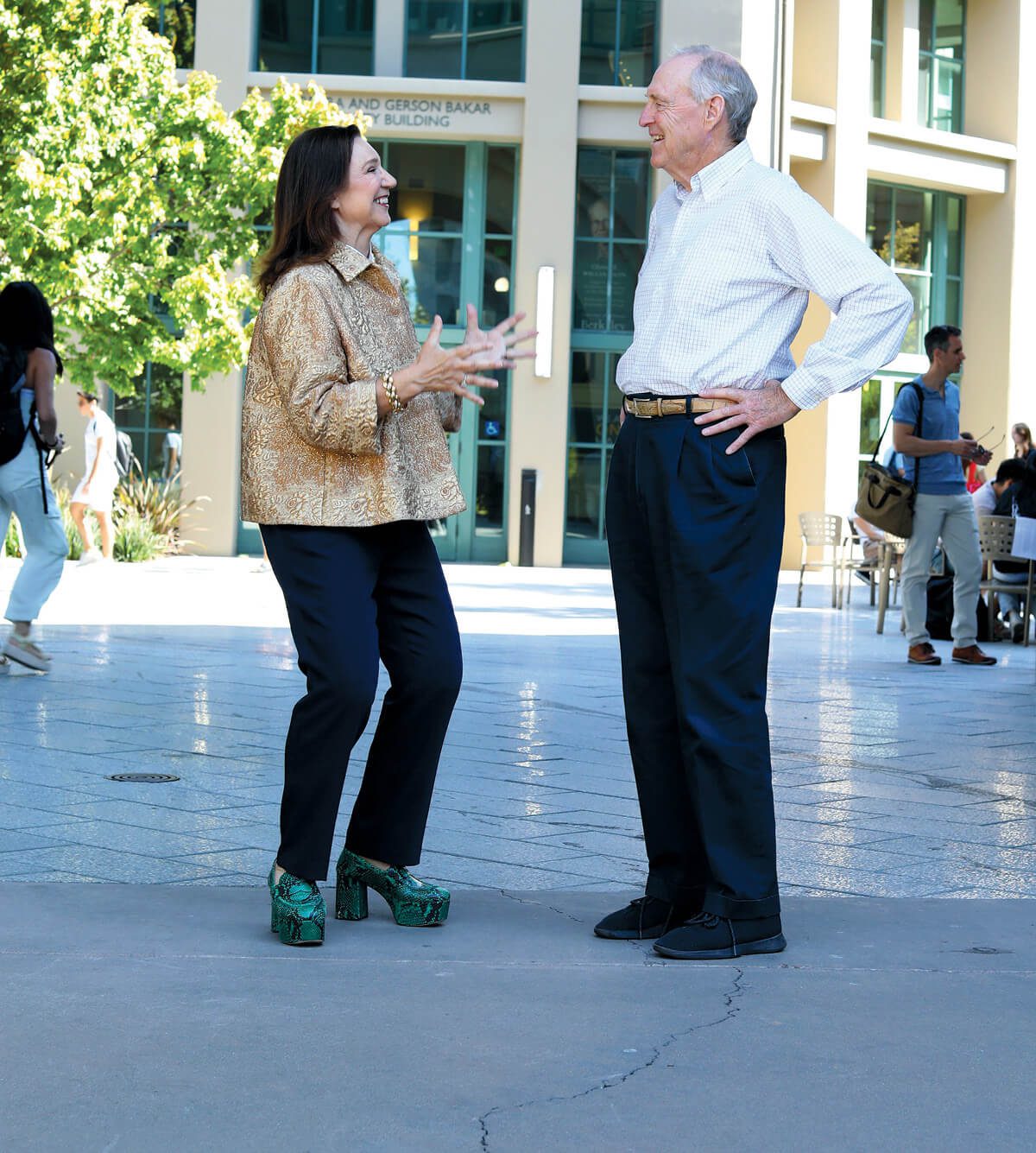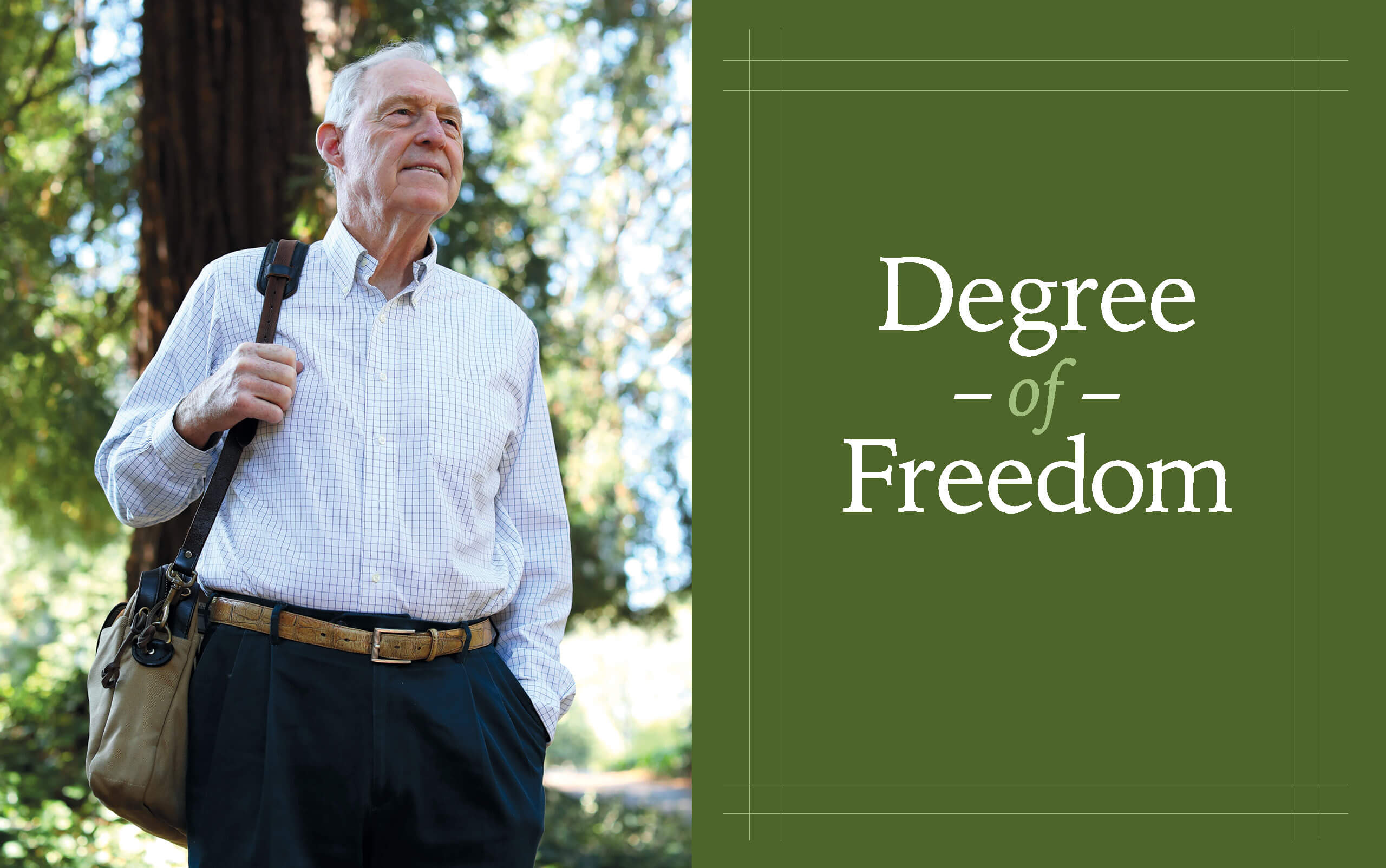With the biggest gift in Haas’ history, real estate legend Ned Spieker, BS 66, has transformed the undergraduate experience for generations to come.
By the time Warren “Ned” Spieker Jr., BS 66, reached his senior year at Cal, he was eager to start his post-collegiate life. He had already met his future wife, Carol Sweeney, and together they were planning their future. Though he could have stayed on another year to earn an MBA—then a one-year program for business undergrads—he felt prepared by his undergraduate business degree. “I felt that I’d had enough basic foundation,” he says. “I was very motivated to get into the business world.”
That’s when fate intervened with a job offer. As president of a nearly broke fraternity, Spieker cold-called organizations to see if they’d be interested in renting the house over the summer. He hit paydirt with a newly formed government organization called the Peace Corps that was willing not only to rent out the house, but also to hire some of his fraternity brothers to clean and serve food and to pay Spieker an administrative salary on the side. “It was a win-win all around,” he says.
The biggest coup for Spieker, however, was when an alum who headed Hawaii-based real estate firm Dillingham Corporation heard about the clever enterprise and called Spieker to ask if he’d considered a career in the industry. He hadn’t, but he didn’t let the alum know that. “At the time, I didn’t understand what real estate was,” Spieker confesses, “but I faked it, and long story short, I got a job.” In reality, Spieker had a real talent for business, which allowed him to launch into a promising career straight from his undergrad days at Berkeley’s School of Business Administration—as the Haas School of Business was formerly known.

Since then Spieker, who was Haas’ Business Leader of the Year in 1998, has become one of the most successful real estate entrepreneurs in the country, eventually building his company Spieker Properties into a real estate investment trust with 42 million square feet of commercial property across the West and a sales price of $7.2 billion by the time he sold it in 2001. He now owns Spieker Senior Development Partners, which has developed over a dozen continuing-care retirement communities and healthcare centers for seniors across California. But he’s never forgotten the excellent preparation that his undergraduate education at Cal’s business school gave him for his career.
Recently, Spieker and his wife, Carol, BA 66 (political science), gave the single largest gift in the school’s history—$30 million—to expand the undergraduate business program from two years to four. The donation will transform the undergraduate experience for business students by providing more opportunities for leadership development, networking, and co-curricular activities as well as state-of-the-art technology upgrades to classrooms in Cheit Hall. The gift will also create the Spieker Scholars Program to recognize outstanding students and enhance scholarship support and outreach efforts to students from all backgrounds. Enrolling its first cohort in fall 2024, the program will be named the Spieker Undergraduate Business Program in their honor.
Spieker is passionate about the value of an undergraduate business degree as a launching pad to gain on-the-job experience. “When time is so valuable, I wanted to try and make it as efficient as possible for young business students to get out into the world,” Spieker says, “and to give hundreds more students at Cal the opportunity to jumpstart their careers in a meaningful way.”
Easing the pressure
Emma Hayes Daftary, assistant dean of undergraduate programs at Haas, considers the gift an unprecedented opportunity. Currently, students interested in business spend their first two years at Berkeley preparing to apply to Haas for their junior year—and enrollment is by no means guaranteed. Just 33% of applicants are accepted into the program. “There’s a tremendous amount of pressure, as they are laser-focused on completing the prerequisites and getting into the program,” Hayes Daftary says. Once accepted, the pressure then switches to making the most of the two years they have, to take the required courses and land the ideal internship to launch them into their preferred career. “They feel this sense of urgency that they have only two years; they have to make the most of every opportunity. This urgency can exacerbate a drive to compete against their classmates and gets in the way of students practicing authentic collaboration and effective team-building before they start their careers.”
With the four-year program, she hopes that students feel a part of the Haas community from the moment they step onto campus, creating more camaraderie among the cohort. “More time in the program will allow our students to create deeper connections with each other and with the larger Haas community. We have amazing students and alumni. We want our students to better understand the power of connecting with their fellow students and our alumni community and to make strategic connections that will guide their academic and career choices.”
Adding to the necessity, many firms are now hiring for summer internships before Berkeley students even know if they are accepted into Haas. Stephen Etter, BS 83, MBA 89, a founding partner at Greyrock Capital Group and longtime lecturer in finance at Haas, says the uncertainty surrounding the business major could be driving prospective students away from the school altogether. “Many top high school students are going to other high-ranking undergraduate programs around the country where they are assured admission as freshmen,” he says.
“When time is so valuable, I wanted to try and make it as efficient as possible for young business students to get out into the world and to give hundreds more students at Cal the opportunity to jumpstart their careers in a meaningful way.”
—Ned Spieker, BS 66
Etter, who has served on the Haas School Board and as a UC Berkeley Foundation trustee, made a personal investment in the new undergraduate program, specifically dedicated to recruiting candidates from underrepresented communities. “The only way we’re going to have diverse senior leadership in American businesses is if we are producing a diverse set of graduates,” says Etter. “Ideally we would have a student body reflective of society.”
Learning balance
Providing opportunities to high-performing students who may be facing financial difficulties is an important part of the Spieker Undergraduate Business Program. Spieker himself faced his own challenges affording his education. The son of a used-car dealer, Spieker grew up in Atherton before it became part of Silicon Valley. He and his father didn’t always see eye-to-eye, and his parents refused to pay for his college. Spieker worked multiple jobs—as a swimming coach, recreational club manager, and delivery person—in addition to keeping up his grades, playing on the water polo team, and helping run his fraternity.
Juggling so many responsibilities taught him the self-discipline that has been the hallmark of his business career. “I learned balance,” he says. “Not just in real estate but in life. I set goals, and I try to achieve them. I think that’s the key to doing really well.”
That sense of balance also applies to his family life. As he and Carol were starting their family, Spieker took a job with the Texas-based Trammell Crow Company, one of the foremost real estate firms in the country. Spieker ran the company’s West Coast operation but insisted that he only develop real estate projects in places that he could fly to and back from during the day, so he could return home to his family by dinner—even if he had to leave at 4 a.m. to get back by 7 p.m. “To have a wife of 55 years and four children and 15 grandchildren is my greatest accomplishment,” Spieker says. “It’s all about setting priorities, and my priority has always been my wife and children.”
“More time in the program will allow our students to create deeper connections with each other and with the larger Haas community ….We want our students to…make strategic connections that will guide their academic and career choices.”
—Emma Hayes Daftary
The new gift isn’t the only way in which Spieker has brought positive change to Haas. In addition to serving on the Haas School Board, he’s also been an active member of the policy advisory board for the Fisher Center for Real Estate & Urban Economics, regularly speaking on campus and mentoring students. The Spiekers’ philanthropic support is evident across campus, recently helping build Haas’ Chou Hall. Spieker Forum, on the building’s top floor, is named for the couple. Spieker actually served as an advisor to the project, helping convince the administration to expand the original plans to maximize the footprint while also reducing costs in design and construction.
Expanding and Innovating
Haas had been looking to expand the undergraduate program for over a decade, as students and alumni have expressed a desire for a longer curriculum and as peer business schools such as the University of Pennsylvania’s Wharton School, New York University’s Stern School, and the University of Michigan’s Ross School of Business offer four-year programs. The first steps came with the 2017 launch of the Management, Entrepreneurship, & Technology (M.E.T.) Program, which allows students to earn both business and engineering degrees in four years.
“It stood out to us as obvious that Berkeley was a place where students should know they could be entrepreneurs,” says Erika Walker, Haas’ senior assistant dean of instruction and former head of the undergraduate program. “With a top business program and a top engineering program, it just made sense to marry the two.”

Students responded enthusiastically to the M.E.T. program, relishing the ability to take business courses their first year as they simultaneously learned to engineer products and services. Building on that success, the following year Berkeley welcomed the first cohort for a new Global Management Program (GMP), a four-year, international business program that kicks off with a semester in London followed by training in management, culture, and language and a later optional semester abroad. Students earn a BS with a concentration in global management—the only concentration offered in the business major. Other recent innovations at Haas include the two-year (soon to be four-year) Robinson Life Science, Business, and Entrepreneurship program, which allows students to simultaneously earn a degree in business and molecular and cell biology, and the Summer Minor in Sustainable Business and Policy, a collaboration with the Department of Agricultural and Resource Economics focused on green business development.
While all of these programs expanded opportunities for students, they serve a relatively small number of undergraduates. Given Spieker’s generous past support of Haas and his own positive experience with the undergrad program, Dean Ann Harrison approached him about funding the undergraduate program’s transformation. Spieker responded enthusiastically from the beginning. “Ned has been such a valued thought partner and supporter to me and to deans before me,” Harrison says. ”We are so thrilled that he and Carol have made a commitment to Haas toward building the next generation of business leaders.”
The $30 million gift will support a range of new programs, services, and scholarships. The aforementioned Spieker Scholars Program will cover tuition and housing for up to four students each year, providing them with a stipend for professional development, to attend conferences or to seed a business idea. Additionally, the gift will fund scholarships that will go toward decreasing students’ unmet financial need—the amount that students have to borrow and pay back—in order to decrease financial barriers for incoming students. The gift will also help improve the student experience with co-curricular programs to integrate students into the Haas community, set them up for academic success, and develop their leadership skills. Students will explore career pathways through strategic networking and internships.
The technology improvements to Cheit Hall classrooms will be comparable to those in the recently built Chou Hall, with audio-visual components for virtual and hybrid teaching. The school is discussing the development of a new capstone program, which will connect undergrad business majors with a Bay Area nonprofit to use their skills to consult on a real-world project with community impact. “It’s one of the things I am most excited about,” says Hayes Daftary. “No matter what sector our students go on to work in, we really want them to recognize that what they’re learning here will continue to make a positive social impact. Going beyond yourself is one of Haas’ core values, and we want to include experiential learning opportunities in the curriculum that allow students to practice this.”
As students strive toward that goal, they’ll be guided by the example of Ned Spieker: A leader who both achieved enormous success in his field and created opportunities for others to succeed as well.
